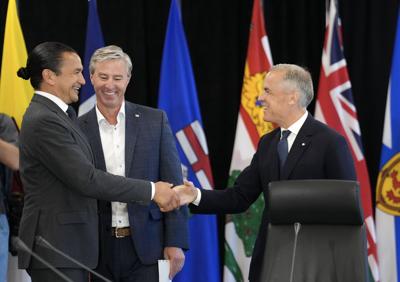HUNTSVILLE, Ont. — When in doubt, manage expectations.
Manage the premiers. Manage the media. Manage the country.
Delivering a confidential update to the premiers at their summit in Muskoka, Mark Carney gave a master class in how the prime minister’s job comes in two parts.
Part I is trade negotiator in chief.
Part II is manager at large of the country’s great expectations.
Unsurprisingly, Carney is struggling with Part I. Bargaining began with the prime minister declaring Canada’s grandiose goals, yet mind control is not as easy as it looks when trying to bend Donald Trump to his will.
Negotiations are not going according to plan.
Which is why Part II is also part of the plan. With talks in the home-stretch, Canada’s stretch goals look increasingly far-fetched as the goalposts keep moving.
Hence the prime ministerial imperative to lower expectations at home, starting with the 13 premiers closeted with him at a posh lakeside resort Tuesday. New tariffs are inevitable as Canada and the world adjust to the unavoidable reality of Trump’s world view, Carney explained.
The premiers get it, having heard it from the prime minister’s mouth. Now they are spreading the word.
Prime Minister Mark Carney updated the premiers on the state of trade negotiations with the U.S. as they met Tuesday in Ontario's cottage country.
In an unprecedented display of unity and solidarity, the first ministers are all singing from the same spreadsheet. They can see the terms of trade but also the trade-offs, the risks as well as the rewards.
Full credit to Trump for getting them all onside — on Carney’s side — as Canada braces for the worst.
Led by Doug Ford, the premiers heaped praise on the prime ministerial skill set. With Quebec’s oft-cantankerous François Legault beside him nodding in agreement, Ontario’s premier catalogued Carney’s achievements while praising his listening ability and humility.
“He’s an honest man, he just wants the best for Canada,” Ford enthused. “He is humble, he listens, he’s a smart businessman.”
Premier after premier echoed Ford’s words, declaring their fidelity to the federal negotiating strategy and the prime ministerial tactics.
“I have tremendous confidence in the prime minister and his team,” exulted Nova Scotia’s Tim Huston. “We’re all binding together and spending time together.”
Indeed, they have bonded beyond expectations. Monday night, after a barbecue hosted by Ford at his nearby cottage, Carney stayed over for the night — and talked long into the night, well after the other first ministers had returned to their rooms at the Deerhurst Resort.
The upshot is that this is Canada’s best shot to clean up its own house, that we may now be masters in their own house — maître chez nous, as Carney so often says in French to Quebec audiences, borrowing from a stock nationalist phrase connoting self-reliance. And so after receiving a vote of confidence from the premiers, Carney proceeded to praise their own willingness to dismantle domestic trade barriers as a way of reducing dependence on American markets.
“We are masters in our own home, and we can control our own economic destiny,” Carney told a news conference before flying back to Ottawa, leaving the premiers to sit down for their annual summit.
“Now we are starting to look at projects of national interest, and that will include a process with the Indigenous Peoples … when it comes to creating a single Canadian economy instead of 13.”
But a single Canadian economy will still be comprised of its parts — 10 provincial and three territorial — in which every politician is destined to remain territorial about where the benefits flow. Projects of national importance will be given priority, but how to define the national interest?
That’s a question that Carney, as prime minister of the entire country, will have to resolve as rival premiers put forward pet projects.
Ford put his best foot forward Tuesday, arguing that Ontario produces steel and other products that would be a good fit for the national economy. But he stressed that the criteria for worthy national projects should be truly national benefits.
Standing by Ford’s side, Quebec’s Legault was uncharacteristically circumspect at the microphone, saying that question was best put to the prime minister.
His silence was strictly diplomatic, in deference to the warm words uttered by Ford about the history of the Quebec-Ontario relationship and their own strong personal friendship. A more candid Legault might have retreated to his recurring demand that federal decisions redound to his province’s benefit and defer to Quebec’s jurisdictional aspirations.
That Legault held his tongue, mindful of his Ontario host, was perhaps a sign of the times and a signpost for Canada’s future direction in a time of American animus. The prime minister, for his part, made the most of the Canadian amity on display in Muskoka.
Asked whether the competition for federal funding “could divide the country,” Carney offered a contrarian view.
“It’s the contrary. For the projects to be of interest, to be of national interest, (they) have to benefit multiple stakeholders, multiple provinces, Indigenous people, also move us towards our climate objectives.”
As the U.S. closes in on Canada, can Carney square the circle?
Part I — renegotiating a trade entente — is the hard part.
Part II — managing expectations (and exhorting collaboration) — is well underway.
Error! Sorry, there was an error processing your request.
There was a problem with the recaptcha. Please try again.
You may unsubscribe at any time. By signing up, you agree to our and . This site is protected by reCAPTCHA and the Google and apply.
Want more of the latest from us? Sign up for more at our newsletter page.
































To join the conversation set a first and last name in your user profile.
Sign in or register for free to join the Conversation